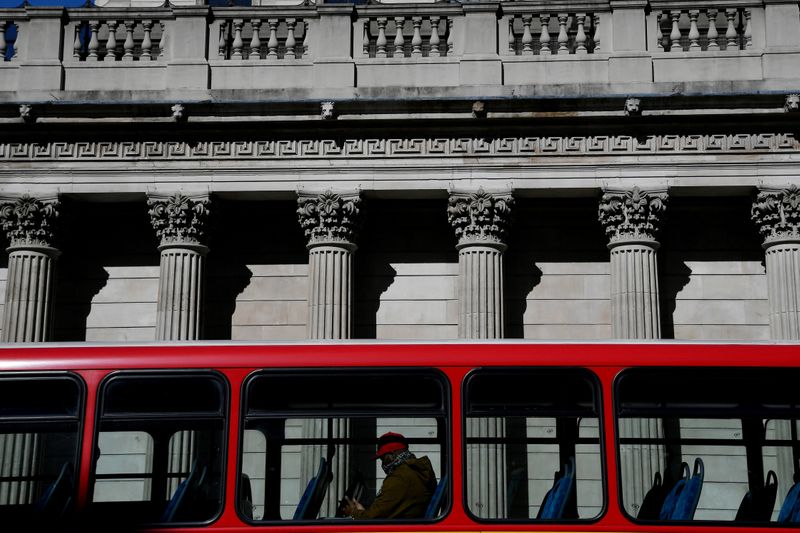By Sujata Rao
(Reuters) - As strict coronavirus lockdowns end, some central bankers have started hinting at another kind of exit -- from emergency stimulus they launched just three months ago. Markets so far appear to be calling their bluff.
The estimated $5 trillion in asset purchases unleashed by the five biggest central banks to cushion the impact of the pandemic has helped lift world stocks to within 10% of record highs, while the global economy seems set for recovery -- confirmed by advance readings of June business activity surveys.
Some central banks have signalled full-throttle stimulus won't last for ever, though, including the Bank of England which last week slowed its bond purchases, citing signs of economic improvement.
Yet in contrast to the decade after the 2008 financial crisis, when any hint that stimulus might be unwound provoked a "taper tantrum", markets have paid little heed.
Responses to the BoE were confined to a brief spike in sterling and a dip in bond prices. Nor did markets react much to People's Bank of China Governor Yi Gang urging stimulus restraint and "timely withdrawal of policy tools in advance".
There are many reasons why central banks may be wary of keeping asset purchases at their current pace, above all the potential for a debt "hangover" highlighted by Yi. But investors reckon policymakers are only preparing the ground for changes.
"My interpretation is that central banks are sending little messages saying 'don't take me for granted'. Now some people will be listening, others won't and others will say 'yeah I heard you, but I think you are bluffing'," said Kim Catechis, head of investment strategy at Legg Mason (NYSE:LM) affiliate, Martin Currie, in Edinburgh.
He said investors likened central banks to firefighters: "They are going to stay there, chucking more water ... until the embers are completely out, and they don't think that the job is done yet."
Chinese 10-year bond yields rose 4 bps on Monday after the PBOC held off cutting its loan prime rate and are up 14 basis points in June. But Shanghai shares (SSEC) are at three-month highs.
Norway's and Canada's currencies meanwhile firmed only modestly following relatively hawkish policy messages, with the Norges Bank even outlining a rate hike path from 2022.
The subdued reaction is partly because the big guns of central banking -- the U.S. Federal Reserve, the European Central Bank and the Bank of Japan -- show no signs of straying from the stimulus path. Fed chairman Jerome Powell vowed last week to keep his "foot on the gas".
And unlike in the previous crisis, governments are also stepping up with trillions of dollars in stimulus spending via income support and infrastructure schemes.
"When I think about the world's two major central banks - the Fed and the ECB, they don't seem to be in any hurry to raise rates," said Salman Baig, multi-asset investment manager at Unigestion. "So I'm not too worried, at least not for now."
GRAPHIC: Fed's balance sheet shrinks - https://fingfx.thomsonreuters.com/gfx/mkt/oakpeqdwmpr/Pasted%20image%201592513591207.png
The Fed's $7 trillion balance sheet shrank last week for the first time since February and its repo balance -- short-term funding deals for commercial banks -- has plunged to nine-month lows. But that is because money market funding strains have abated and other central banks are tapping the Fed for fewer dollars.
GRAPHIC: G4 central bank balance sheets - https://fingfx.thomsonreuters.com/gfx/mkt/jznpnzeoxpl/Pasted%20image%201592900329850.png
NORMAL
Given the improving growth and markets picture, some tinkering with policy settings may be inevitable.
"Policy is on an emergency dial at the moment and clearly emergency settings are not supposed to be indefinite," said Sarah Hewin, chief Europe economist at Standard Chartered (OTC:SCBFF).
"They are saying QE is in place and we don't think there is a need to be going full pelt."
It also could be that policymakers are getting queasy about debt levels: Britain's public debt ratio recently surpassed 100%. This is why the Bank for International Settlements, the umbrella group for central banks, is urging efforts to return policy to "a new normal".
But few expect a serious rowback soon. The global economy is expected to contract 6% this year, with further lockdowns still a risk.
There are also lessons from the past. The ECB's 2011 interest rate rise and the Fed's move that year to start shrinking its balance sheet are often blamed for strangling the recovery after 2008.
"Willingness to keep the taps open and not retrace course too early -- that's one of the big lessons from the financial crisis," said Jeroen Blokland, portfolio manager at Robeco.
"Central banks will try to remove some stimulus only if the recovery is structural."
